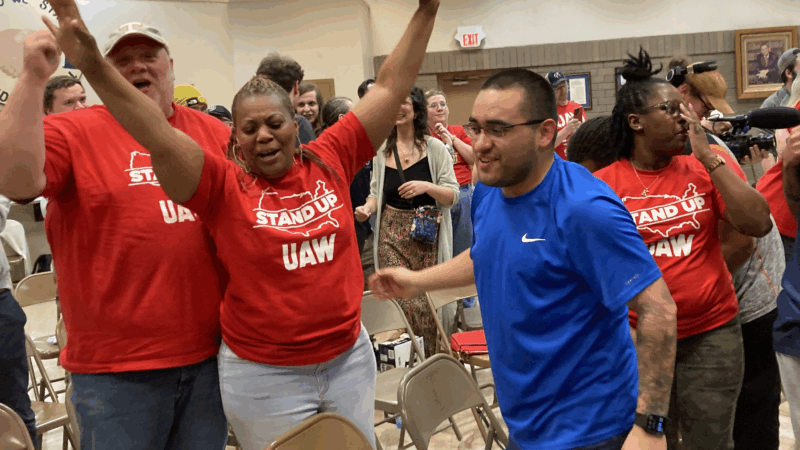Alabama and the Oil Spill: Protecting the Beaches
BP continues to try to stop the flow from the oil leak in the Gulf of
Mexico. Oil has already come ashore in Louisiana. And other coastal
communities are scrambling to prepare. As WBHM’s Tanya Ott reports, volunteers in Alabama are taking some low-tech steps to protect the shore.
Within days of the oil rig explosion, Casi Callaway’s phone started ringing off the hook.
“I have hundreds of volunteers calling every minute.”<?p>
Okay, well maybe not every minute. But Callaway’s group, Mobile Baykeeper, has been very busy organizing volunteers. In the past week more than 7,000 people have flocked to the white sands of the Alabama coast hoping to help.
They’re combing every inch of the shoreline, picking up trash and raking driftwood and sticks into the dunes. Normally they’d let the natural debris stay on the beach. But if it gets coated with oil it becomes hazardous waste and has to be shipped to a local landfill. So volunteers are working round the clock to move the material. Tom Herder is with the Mobile Bay Estuary Program. He says they have to be careful because this is nesting season for wading birds like Plovers and Terns.
“You know we were the dumb transgressors the first day. I was throwing stuff in the dunes. And we were just moving stuff up and I wasn’t looking for Plover nests and the Audobon Society kinda got on my case. And it’s good, they educated us. And we’re educating our volunteers.”
They’ve been training volunteers on how to remove debris without disturbing wildlife. But Herder says the clock is ticking and there’s still lots of work to do. So they’re balancing the need to protect wildlife with the need to get the beaches ready. Herder says to do that they’ve been bending the rules a little bit.
“People have to be 18 years old to take part in our volunteer efforts. Shoot! That’s not necessarily the way people do things here. And we tell people, if you live on the Western shore of Mobile Bay don’t wait for us. Get down there and clean it up yourself. You know. And that’s not rogue.”
While volunteers work to get the beaches ready for oil, BP says it’s working to keep the oil from reaching the shore. It’s using what are called chemical dispersants – basically it’s industrial detergent – to break up the oil deep under the surface. But critics say the chemicals could kill off the larvae of fish that use the Gulf of Mexico for spawning grounds. Fish like the Atlantic bluefin tuna. It could also hurt oysters and mussels. But BP’s Steve Rinehart says there’s always a tradeoff.
“Nobody wants an oil spill. We have an oil spill. You need to make judgments about limiting the damager where you can.”
Rinehart says a group of state and federal spill responders, including environmental scientists, has determined that dispersants pose the least risk.
“If the choice is oil going to shore or using dispersant off shore, using dispersant off shore causes less environmental impact. That’s not to say there won’t be some, but it’s less harmful to the environment than having the oil go to shore.”
So basically, it could be an “either/or”: protect the beach with dispersants and you might risk the fish. Tom Herder, with the Estuary Program, says it’s a no-win situation.
“I’ve almost been making deals with God. And I can’t bribe God, but he knows I’ll follow through.”
Right now, Herder’s just praying for good weather and more time to get the Alabama coast prepared.
Venezuela approves amnesty that may release of hundreds detained for political reasons
Venezuela's acting president has signed into law an amnesty bill that could lead to the release of politicians, activists, lawyers and many others. The approval marks a stark turn for the nation.
In a historic vote, Tennessee Volkswagen workers get their first union contract
Two years ago, the successful union drive at this plant was expected to spark victories throughout the South. But now, as members vote to make their contract official, momentum has fizzled.
NASA chief blasts Boeing, space agency for failed Starliner astronaut mission
NASA's Jared Isaacman slammed Boeing for failures with its Starliner spacecraft, which was deemed unsafe to return its crew of two astronauts from the International Space Station
Internal memo details cosmetic changes and facility repairs to Kennedy Center
Trump announced his plans to close the Kennedy Center entirely for two years "for Construction, Revitalization, and Complete Rebuilding." The announcement came after many prominent artists canceled existing scheduled appearances.
Baby chicks link certain sounds with shapes, just like humans do
A surprising new study shows that baby chickens react the same way that humans do when tested for something called the "bouba-kiki effect," which has been linked to the emergence of language.
American Jordan Stolz speedskates to a third Olympic medal — silver this time
U.S. speedskater Jordan Stolz had a lot of hype accompanying him in these Winter Olympic Games. He's now got two gold medals, one silver, with one event to go.






